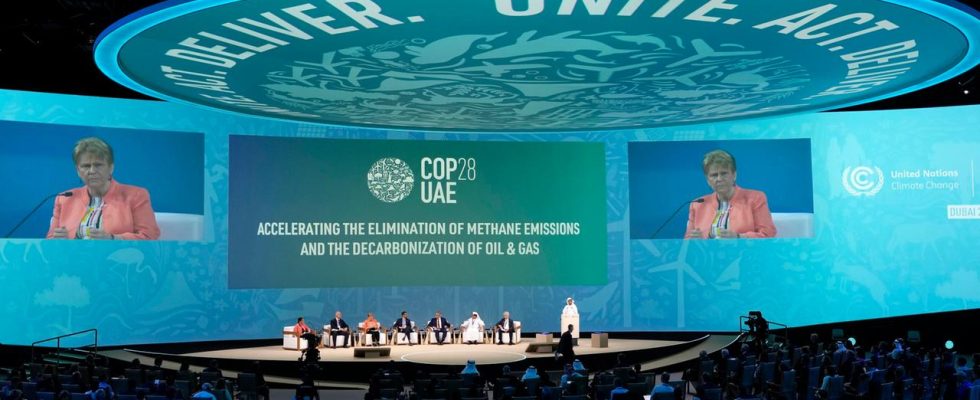Many countries hope that the UN climate conference will seal the phase-out of fossil fuels – but some are against it. At half-time it remains questionable whether the summit will agree on moving away from coal, oil and gas.
Halftime at the climate summit – and almost all important questions open: German Climate State Secretary Jennifer Morgan speaks of sometimes cumbersome negotiations, but also of positive dynamics. The conference cleared up a controversial topic right at the start by setting up a fund to compensate for climate-related damage and losses in poorer countries. It currently amounts to around $700 million.
“This builds trust and takes a load off the hearts of vulnerable countries,” says Morgan. “That leaves plenty of space for the other important issues, such as how we keep the 1.5 degree target within reach.”
Now the delegations from almost 200 countries are discussing a draft text from the conference president until late at night. This is about taking stock of climate protection worldwide. It is already clear that the governments’ current targets are not enough to limit global warming to 1.5 degrees as planned.
Disagreement about phasing out fossil fuels
Nevertheless, it is questionable whether the summit will fundamentally agree on moving away from coal, oil and gas. According to Morgan, there are big differences between individual countries: “It’s of course a very tough fight, but Europe is well equipped, Germany can play its role as a bridge builder with all its partnerships. And I think we’re going into the second week strong .”
Around 100 countries want to formally decide to phase out fossil fuels in Dubai. Oil-producing countries such as Saudi Arabia are opposed to this – as are Russia and India, which rely heavily on coal burning. However, their delegations have not yet made any comments at the summit.
High expectations Summit decisions
The head of the UN Climate Secretariat, which is organizing the conference, is calling on participants to make ambitious decisions: “What is crucial now is to separate the wheat from the chaff,” says Simon Stiell. “In order to save lives and keep the 1.5 degree target within reach in the fight against climate change, the focus must be on achieving the most ambitious result possible. The summit must deliver a high-speed train to accelerate climate protection.”
The responsible commissioner, Wopke Hoekstra, emphasized in Dubai that it shouldn’t be up to the 27 EU states: “I want this summit to represent the beginning of the end for fossil fuels. That is crucial for the EU and for our negotiating mandate here. That is “All 27 EU states want this to be reflected in the result. We simply have to get rid of fossil fuels.”
The USA – the second largest emitter of climate-damaging greenhouse gases after China – is also committed to this goal. The US special envoy John Kerry refers to scientific guidelines: “This means that we have to somehow get out of fossil fuels in order to achieve the goal of climate neutrality by 2050. There is no other way. So a broad phase-out of fossil fuels of energy production by 2050 and CO2 storage in particularly difficult areas such as steel, cement, aluminum. It will be a mix that will lead us to success.”
After all, around two thirds of the participating states at the summit have now supported the demand to triple the installed capacity of renewable energies by 2030. Climate State Secretary Morgan sees this as a strong signal for further negotiations. Starting tomorrow, Foreign Minister Annalena Baerbock will be in charge on the German side.
Jakob Mayr, ARD Brussels, currently Dubai, tagesschau, December 6th, 2023 4:44 p.m

